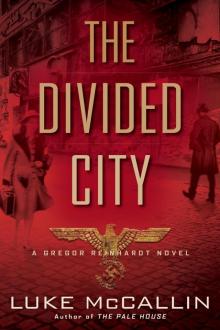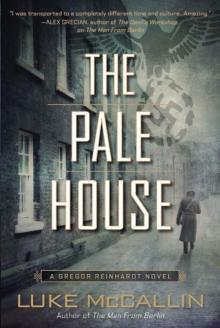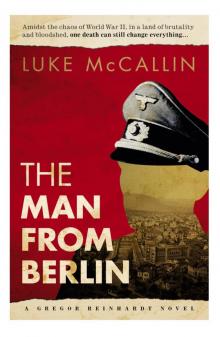- Home
- Luke McCallin
The Pale House Page 16
The Pale House Read online
Page 16
Jansky’s smile widened, as if he felt the ground under his feet firming. “Far be it from me to criticize our judicial brethren, but Dreyer has a . . . reputation. He wouldn’t be after a little help, now, would he? Hmmm?” He smiled, broader still. “Or else, better hope you’ve nothing in your past you wouldn’t want brought out into the light. Times like these, you never know who your friends are, but your enemies—you can usually tell them rather easily.” The smile folded back in on itself, back to that straight line. “I’ve always found that rather comforting. And as I often say, ‘All are not huntsmen who can blow the hunter’s horn.’ You might remind Dreyer of that when next you see him.”
With that Jansky strode off, hands clasped almost daintily behind his back, trailed by the other German who had entered with him. It was one of the two clerks from the penal battalion’s office, Reinhardt realized, the one from the corner, almost hidden behind his rampart of paperwork. As the man walked past, he seemed to cringe away from Reinhardt, clutching his red chest close as he went by, something clinking inside it.
The sun was low in the west, a watery glow across the slate-gray sky, as Reinhardt sat in the barracks communications center, a shallow sheaf of papers at his elbow. They were all of the after-action reports Benfeld had been able to dredge up, going back a week. Reinhardt could find nothing in the dry prose of the reports resembling a pattern, or anything resembling any theory Reinhardt could devise. The front lines had been quiet, but it was the quiet before the storm. Everyone knew the Partisans were gathering, choosing their time, but with little to no armed conflict with the Partisans in the past week as well, even that angle of checking the reports, or looking for men lost or missing in action, was closed off.
There had been only sporadic contacts across the front line, no significant casualties, and no prisoners taken. There were reports of a handful of deserters and Reinhardt toyed with the idea of trying to match descriptions with the bodies, but he gave it up as unworkable. Instead he mused about the likelihood that those five bodies from the construction site could have come from different units and be mentioned in different after-action reports. In which case, he acknowledged to himself, it would be all but impossible to trace five different bodies through that paperwork with any hope of finding all of them in a cellar in a bombed-out neighborhood. Making matters worse, Benfeld’s search of administration had found no sign of a Berthold or Seymer. There was one option, Reinhardt knew, though he had been reluctant to take it until now.
“Captain, sir. Your call has been placed.”
Reinhardt followed the signals operator through to a small room with a telephone. The receiver was already lying on the table. Picking it up, he heard the click of the operator, and then a distant hum on the line.
“Hello? Koenig?”
There was a silence. “Reinhardt?”
“It’s me, Koenig.”
“What a pleasant surprise.”
“I’m glad you think so. How are you?”
“Well, thank you. Not much changed since the last time we met.”
“Well, it was dark then; you could have looked like anything,” said Reinhardt, forcing a little levity into his voice.
“Well, I suppose the blackout must be good for something. And yourself?”
“Very well, thank you. I am in Sarajevo.”
“Yes, so I understood.”
“Koenig, I wish this were a social call, but I have a favor to ask.”
The pause was slower, Koenig now reassured it was Reinhardt by the exchange of what they sincerely hoped were innocuous-sounding phrases. They were anything but and were in actuality their resistance cell’s codes to reassure members that the person calling was not doing so under duress.
“Of course, anything I can do.”
“I am trying to trace two soldiers. Their names have turned up in an investigation ongoing down here.”
“What is it you think I can do?”
“Are you still on the staff of the Vienna Garrison?”
“Yes.”
“I am hoping you can check army administration records up there for me, as you have access to personnel records from across the Balkans.”
“I can try. What are the names and units?”
“I only have surnames. Berthold and Seymer,” Reinhardt replied, spelling out the names. “They were both serving a sentence in the 999th Balkans Field Punishment Battalion.”
“A penal battalion?” came Koenig’s surprised reaction.
“Yes. And, one more thing. Anything you can find out about a Feldgendarmerie Major. Erwin Jansky. Currently assigned to the 999th.”
“What sort of things?”
“Deployments. Service history.” Reinhardt paused. “Disciplinary record.”
There was a pause. “How soon do you need this?”
“Soon, Koenig.”
“How can I reach you?”
“Through the switchboard here at the Kosovo Polje barracks. You can also leave a message for me with Lieutenant Benfeld, Feldjaegerkorps.”
“I’ll see what I can do.”
“Thank you, Koenig. Good-bye.”
“Good-bye.”
He sat there a moment after he replaced the receiver, embarrassed at the stilted edge to the end of their conversation. He would have liked to share more with Koenig, just as he would have liked to ask after the others in Vienna, but the risks were too great for that. Instead, he glanced at his watch and saw it was nearly time. He walked back through the barracks, taking it slowly, pushing his mind past the scrum of activity in its halls, ignoring the men bundled in blankets along the corners of walls for want of beds. In the Feldjaeger operations room, he scrawled a note on his conversation with Koenig for Benfeld, then left for the car pool, where a kubelwagen was waiting for him. He gave the driver directions, then slumped into its bucket seat as the kubelwagen shuddered its way around onto the long curve of Kvaternik Street.
“This is it, sir,” said the driver.
Reinhardt started up out of his thoughts, if the confusing echo within his mind could be called such, the cold clenching tight and stabbing through his knee as he looked up and around. The car was parked in front of a pair of battered wooden doors standing open. Next to them was a handwritten sign on a large sheet of paper. Posla, it read. He frowned, trying to translate it as people walked past him and into the building. The happenings in the market? The doings of the bazaar . . . ?
It was a theater.
Reinhardt looked up and down the street. The sky hung heavy over the city, the smell of rain stronger, and the street faded away fast into the gloom. Leaving instructions for the driver to wait, Reinhardt walked up the steps and into a small foyer, packed with an eddying shuffle, a flow of people moving toward a tall set of doors in the opposite wall. Standing to one side, her ash-blond hair bright under a cluster of candles, laughed with a tall man, his gray hair awry and a red scarf thrown dramatically over one shoulder. The man looked askance at Reinhardt as he came in, sliding to one side to get out of the way of the people pushing in behind him, but smile came easily, naturally, as she came up to him, her hands extended.
“Captain. I’m so glad you could come.”
“A play, Ms. ?” he asked, as he tucked his cap under his arm and folded her hands into his own.
“Call me Suzana, please,” she said, nodding and smiling, looking back and around. It was a theater, or what passed for one. There was a burst of laughter from farther inside, and a warm glow, like candlelight.
“Come,” she said. She stepped back, their arms coming up straight between them, and he gave in and followed her. “I must greet some more people and I had arranged to help. Please, go through. Go in. Enjoy it. Wait for me here afterward?” She smiled again, and then slipped away.
Reinhardt paused to strip the gorget from around his throat, sliding it into his pocket, and only
then passed on into a large room with a low ceiling. The place was stifling in the dim light, braziers burning in each corner, and the room was packed with people—men, women, even a few children—sitting on rows of benches and lining the walls. Up at the front of the room was a stage, what seemed to be planks of wood raised up on something hidden behind a heavy, red drape. Reinhardt shuffled to the side as someone came in behind him, then smiled apologetically as he squeezed into a space between two men. Only one of them glanced at him, a flat, disinterested gaze. He leaned back against the wall, taking his weight off his left foot, and waited.
Eventually, as happens in crowds sometimes, a hush started to descend. People stopped talking, straightened, looked around and over their shoulders. A man came in to dim the lanterns and candles burning along the walls. Another man stepped out onto the stage, the man from the entrance with the red scarf, the boards creaking under his weight. He smiled out at the crowd, opened his arms to welcome them, and began to speak.
Reinhardt lost the details quite quickly. The man spoke fast, with an accent, but Reinhardt managed to follow the gist of it as the man thanked them for coming and explained something about the need to pause and remember other times. He was applauded off after a few minutes, and the play began as a woman in an Ottoman costume and bent under a heavy load shuffled onto the stage, followed by a man in what seemed to be an absurdly small waistcoat and oversized turban with a pair of slippers the tips of which curled up almost to his knees. The audience laughed as other characters appeared left and right in all kinds of dress, and began to set up what looked like a marketplace.
With lights out and his attention focused on the stage, Reinhardt slowly took off his coat, holding it folded over his arms. He gave up trying to understand the dialogue and was content to follow along with his eyes, his mind fastening on a word or phrase here and there. The audience clearly loved it, giggling, chuckling, and laughing uproariously as the characters skipped and stepped and shambled around their market. Merchants and mercenaries, an innkeeper and a man who ran a secondhand shop, a fancy lady, a beggar woman, the actors shouted and whispered and, from time to time, broke into song. The action was maniacal, the words came thick and fast in blurs of color and speech, heavy with what Reinhardt understood to be Sarajevo slang, and after a while he stopped watching the play and instead watched the audience, let himself relax into them.
There was a ripple in the row of people at the back. Reinhardt glanced to the side, seeing a man stepping cautiously into the darkened room. The man’s head craned around, left, right, a tiptoe bob of his head as he looked forward, looking for space to stand, no doubt, what little light there was limning the edges of his heavy beard. Against the raucous action on the stage where a chicken and its feathers were the subject of intense and prolonged bargaining, the man began to sidle down the back row, murmuring apologies as he moved, eventually worming his way into a space between Reinhardt and another man.
“Oprostite, komšija, žao mi je,” the man apologized, somewhat breathlessly, to Reinhardt and his neighbor. Reinhardt said nothing, not understanding and not following the whispered conversation between the newcomer and the man who had originally been standing next to Reinhardt. He ignored them, soaking in the mood and atmosphere in the room. The play meant something to them, Reinhardt knew, wondering again about the ability of people to come up with things like this at times like these until he stopped wondering about it and just became part of it, until a thread of speech he understood very clearly darted out of the night, whispered straight into his ear.
“Captain Reinhardt.”
Reinhardt froze, then turned his head, slowly. He could not make out the features of the man next to him, only the glitter of his eyes from the lamps on the stage.
“Please come with me.”
Something hard was thrust into his ribs, and a hand scrabbled across his holster, unfastened the catch, and pulled his pistol out with a dull rasp of metal on leather.
“Quietly. You first. Now,” the man hissed.
Reinhardt stepped softly back along the row of people, feet slithering out of his way, and the man behind him whispering apologies, once exchanging some quiet joke with someone, until they came to the door to the foyer. Reinhardt opened it quietly as the man followed him out. A second man stood in the deep shadows by the closed front door, his face all but hidden in a scarf wrapped high around his neck. The two men exchanged glances, signals, the second man shaking his head as he glanced out at the street through rippled glass panes.
“This way,” the first man said, pointing him across the foyer, toward a narrow door behind what used to be a bar, the shelves empty of bottles. At a nod from the man, Reinhardt opened the door onto a small room, bare of furniture. A third man stood there. Tall, black-haired, a black coat hanging from broad shoulders, hands clasped one over the other in front of himself. It was the man Reinhardt had seen at the hospital, and at least one of the men he had been sure had followed him that morning.
“Hello, Simo,” said Reinhardt.
“Captain,” Simo replied, gravely, inclining his head.
“A bit dramatic all this, isn’t it?”
“If it is, it would be the place for it, do you not think?”
Reinhardt smiled, but it all felt slippery, a hasty façade over the confusion he felt inside, a presage as if some great weight were about to settle around him. “Couldn’t you have come to me in town? I gave you all enough of a chance earlier today to get close to me.”
“We are doing it now.”
“So? What is the meaning of this, Simo?”
“Somebody wants to see you.”
“You’ve done this to me before, you know. Lured me off, took me to meet someone. To meet Dr. . You told me that it would be in my interest.”
“And it was, wasn’t it?”
Reinhardt paused, sighed. “I suppose it was, yes. And just how is the good doctor?”
Simo inclined his head again, pursed his lips. “As well as can be expected, given the circumstances.”
“You know, if he wanted to see me, there must’ve been easier ways than this.”
“It is this way, Captain,” Simo said, opening a narrow door behind him that, until he moved, had been all but invisible.
Déjà vu swept over Reinhardt, memories of that house in Bentbaša where he had met , gained the help and respect of a man who ought to have been his enemy, and begun his journey toward reconciliation with himself and his place in this war. But he had always known— had always known, as well—that that reconciliation would mean different things to different people. That the further its implications traveled from Reinhardt, the more ways there would be to understand it. The truth of Reinhardt’s reconciliation was not immutable, and the shape and strength of it would be tested beyond that door, Reinhardt knew, and he was suddenly terrified that he was not ready. That he had not been ready these past two years.
These thoughts scrambled across his mind as he ducked through the doorway, Simo in front of him, the man with the thick beard close behind. They walked up a cramped flight of stone steps, the walls flaked with concrete and plaster. At one point, a wave of laughter swept over them, a shrill of high-pitched voices beneath it, and Reinhardt realized they must be over the theater. Then it was gone, deadened as the walls thickened and the steps flattened into a confined corridor that turned, squeezing them one way, then another. The floor became wood, and the Partisans walked quietly, carefully, motioning Reinhardt to do the same. More voices could be heard around them, nothing distinct, and then Simo was climbing a ladder, metal rungs bolted to a brick wall, and Reinhardt went up after him, the bearded Partisan hard on his heels.
The ladder ended in a flat floor of heavy-beamed wood. Reinhardt placed his elbows, then palms, on the floor and shrugged himself up into the dark space. Only a skylight gave any illumination onto what sounded and felt like an attic, the air bone-cold and lay
ered with dust and mold and damp. Simo loomed in front of him, a big hand coming up to stop Reinhardt where he was, the bearded Partisan standing behind him at the top of the ladder. Simo said something into the darkness and was answered. A pause, and there was a metal scrape, then a buttery spread of yellow light as a lantern was unshaded, the size of the attic swelling out of the dark even as the details of its shape leaned backward into deep shards of darkness.
The lantern stood on a small, round table. There was a pair of mismatched stools to either side of it, and a group of men stood on its far side. Standing on the other side of the light, they were hard to make out, but Reinhardt caught the glimpse of light on metal and the dull fittings of weapons held across chests. One of the men standing closer to the light than the others walked forward, stopping by one of the stools. He was not tall, but he was thickset, his head topped by a scrub of close-cut hair atop a broad forehead, his mouth narrow beneath a wide, flat nose.
He sat, indicating the other stool for Reinhardt. Simo moved to one side, and Reinhardt walked forward to the table and sat. The other man examined him, his eyes glittering beneath the heavy, bowed line of his brow. He leaned forward, the light fitting itself more closely across his face, and Reinhardt saw he was very young, not even thirty years old.
“Captain Reinhardt,” he said, finally. “Do you know who I am?”
“I can guess.” The man’s eyes widened fractionally, inviting Reinhardt to continue. “You are Valter.”
The man nodded. “Vladimir is my name. You are maybe only German to know that. I give you that, for trust. There must be trust between us, Captain,” he said, his German heavily accented, his face very calm.
“Trust?” Reinhardt worked a mouth gone very dry, his tongue stealing into that gap in his teeth. It was very cold, and he suppressed the urge to shiver. “Trust would presuppose at least a relationship between us.”
“A relationship we will have, Captain. You will do some things for me. I will trust you to do those things. You will trust me to give you some time to do them.”

 The Divided City
The Divided City The Pale House
The Pale House The Man from Berlin
The Man from Berlin The Pale House (A Gregor Reinhardt Novel)
The Pale House (A Gregor Reinhardt Novel)